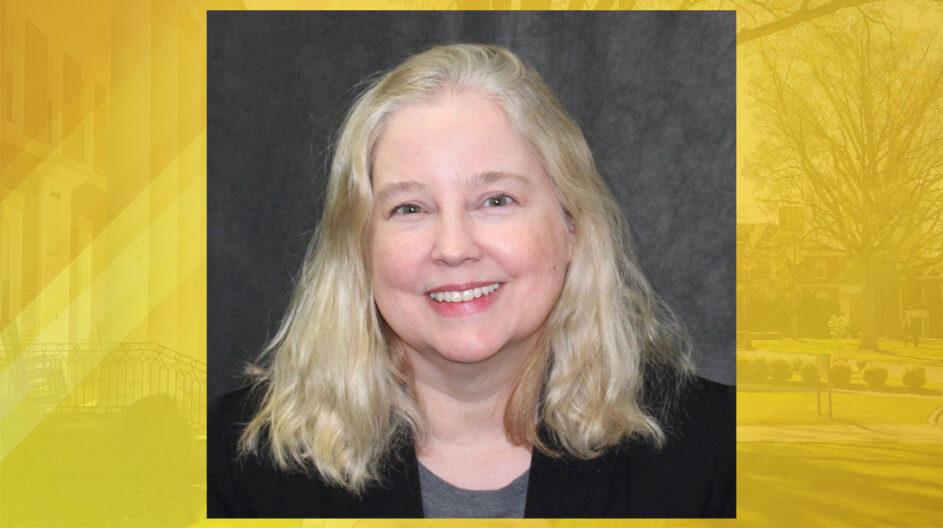
Robinson Rolls Out Handshake and Other Career Services
Sharon Robinson, the Director of Career Services and Internships at Pfeiffer University since January, aims to connect students early and often with the many benefits her office can offer them. “Career Services encompasses your whole time at Pfeiffer, not just the end of your senior year,” she said.
Robinson came to Pfeiffer from Wingate University, where she held career development and advising positions for almost 14 years. During a recent interview, she reviewed what students can expect from Career Services, and she plugged Handshake, a new online career services management tool she began rolling out in November. She pledged to develop a range of ways that students might connect with alumni who could offer advice and mentoring to assist them in their career goals.
Robinson recently organized an on-campus event for freshmen in which alumni talked to them about their career paths and what they’ve experienced after graduating. The aim was to get the students thinking about which majors to choose during their First-Year Seminar courses, a key part of the University’s culture of mentorship. In the spring, these students will fill out an online assessment that’s designed to help them further confirm an appropriate major and career path.
When the students become sophomores and juniors, Career Services and Internships will begin helping them craft resumes and cover letters, in addition to assisting them in finding internships or part-time jobs. And during their senior year, the students will work with Career Services to tailor resumes, cover letters, and interview strategies to specific jobs.
Robinson stressed that her office is flexible enough to accommodate a range of needs.
“Maybe, students will feel that more exploration of possible careers is in order,” she said. “In that case, shadowing someone at work can be an option.”
For students who see graduate school in their future, Career Services stands ready with three “preparation events.” One would help them with the application process, and another would delve into how you pay for graduate school.
The third preparation event for the graduate school-bound student affords them Writing Center assistance with the personal statements and essays required of them on applications.
Robinson succeeds Dr. Caroline Sowards ’07, who’s now an Assistant Professor of Psychology at Pfeiffer. Robinson had known of Pfeiffer for some time, having joined forces with it and other schools at an annual centralized career fair in Charlotte, N.C. She likes its small size and its willingness to pursue and embrace changes that might improve Career Services’ impact on students.
One such change is Handshake, about which Robinson is quite optimistic, for many reasons. The system is designed to reach large numbers of potential employers across the nation that are intentionally looking to hire students–unlike LinkedIn, where recruiters aim to reach a much broader audience of job-seekers.
As many as 5,000-10,000 job openings are posted on the platform, and Robinson wants it to be viewed as the University’s “central place” for jobs and internships. In the past, openings had been posted across various online sources that weren’t offering a “one-stop shop.”
Robinson views Handshake as a great resource to connect Pfeiffer students with employers that are not in close proximity to the University’s campus.
Finally, Handshake aims to be student-friendly. Students post and share short videos about their internships, for example. They can exchange messages on how a job or internship is going. In many instances, students also have the opportunity to exchange messages with a recruiter from a prospective employer in which they are interested.
Robinson stressed that certain programs aren’t necessarily posted on Handshake, so she works to bring them to the attention of students who might be a good fit for them. These programs go by several names: Management Trainee, Management Development, or Leadership Development.
While each of the programs is structured differently, they usually share features in common. These include opportunities to get training in classroom or on-the-job settings; and to gain access to or be mentored by a company’s current leaders. Most crucially, the programs are “rotational” in the sense that participants rotate through different departments, roles, or locations. The result: If someone’s going to work in finance, for example, they might also work in accounting, may shadow customer service employees, and may work in 2-3 different locations.
“You need to see the other areas of business, so you know how your job in finance impacts them,” Robinson said.
As Robinson considers how Career Services and Internships can better serve Pfeiffer’s students in the future, she’ll be asking them lots of questions. In what areas do you need support? What’s the best time to hold an event? Is the event aptly named? How do we change an event so that it’s more meaningful and useful?
“Student feedback is really important,” she said. “I really want to know what we might do differently in order to best serve student needs. That’s one of the great benefits of a smaller University like Pfeiffer – we can easily pivot to make sure that we are meeting students where they are and helping them get to where they dream of being.”